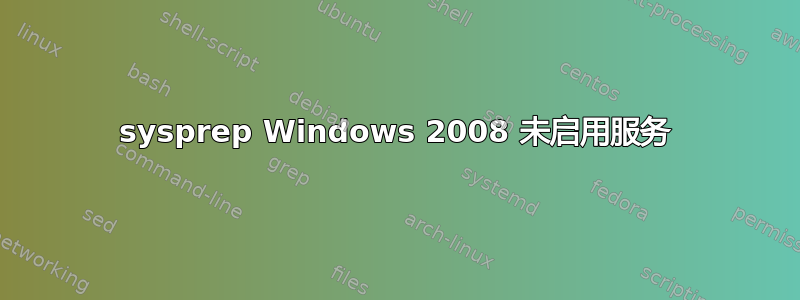
我有以下unattend.xml适用于 Windows Server 2008 R2 Enterprise 的文件。
<?xml version="1.0" encoding="UTF-8"?>
<unattend xmlns="urn:schemas-microsoft-com:unattend" xmlns:ms="urn:schemas-microsoft-com:asm.v3" xmlns:wcm="http://schemas.microsoft.com/WMIConfig/2002/State">
<settings pass="windowsPE">
<component name="Microsoft-Windows-PnpCustomizationsWinPE"
publicKeyToken="31bf3856ad364e35" language="neutral"
versionScope="nonSxS" processorArchitecture="amd64">
<DriverPaths>
<PathAndCredentials
wcm:action="add"
wcm:keyValue="1">
<Path>C:\Windows\Temp\virtio</Path>
</PathAndCredentials>
</DriverPaths>
</component>
<component name="Microsoft-Windows-International-Core-WinPE" processorArchitecture="amd64" publicKeyToken="31bf3856ad364e35" language="neutral" versionScope="nonSxS" xmlns:wcm="http://schemas.microsoft.com/WMIConfig/2002/State" xmlns:xsi="http://www.w3.org/2001/XMLSchema-instance">
<SetupUILanguage>
<UILanguage>en-US</UILanguage>
</SetupUILanguage>
<SystemLocale>en-US</SystemLocale>
<UILanguage>en-US</UILanguage>
<UserLocale>en-US</UserLocale>
<UILanguageFallback>en-US</UILanguageFallback>
<UserLocale>en-US</UserLocale>
</component>
<component name="Microsoft-Windows-Setup"
publicKeyToken="31bf3856ad364e35"
language="neutral"
versionScope="nonSxS"
processorArchitecture="amd64">
<DiskConfiguration>
<WillShowUI>OnError</WillShowUI>
<Disk wcm:action="add">
<DiskID>0</DiskID>
<WillWipeDisk>true</WillWipeDisk>
<CreatePartitions>
<CreatePartition wcm:action="add">
<Order>1</Order>
<Extend>true</Extend>
<Type>Primary</Type>
</CreatePartition>
</CreatePartitions>
<ModifyPartitions>
<ModifyPartition wcm:action="add">
<Format>NTFS</Format>
<Order>1</Order>
<PartitionID>1</PartitionID>
<Label>System</Label>
</ModifyPartition>
</ModifyPartitions>
</Disk>
</DiskConfiguration>
<ImageInstall>
<OSImage>
<WillShowUI>Never</WillShowUI>
<InstallFrom>
<MetaData>
<Key>/IMAGE/Name</Key>
<Value>Windows Server 2008 R2 ENTERPRISE</Value>
</MetaData>
</InstallFrom>
<InstallTo>
<DiskID>0</DiskID>
<PartitionID>1</PartitionID>
</InstallTo>
</OSImage>
</ImageInstall>
<UserData>
<AcceptEula>true</AcceptEula>
</UserData>
</component>
</settings>
<settings pass="specialize">
<component name="Microsoft-Windows-Shell-Setup" processorArchitecture="amd64" publicKeyToken="31bf3856ad364e35" language="neutral" versionScope="nonSxS" xmlns:wcm="http://schemas.microsoft.com/WMIConfig/2002/State" xmlns:xsi="http://www.w3.org/2001/XMLSchema-instance">
<ShowWindowsLive>false</ShowWindowsLive>
<TimeZone>India Standard Time</TimeZone>
</component>
<component name="Microsoft-Windows-TerminalServices-LocalSessionManager" processorArchitecture="amd64" publicKeyToken="31bf3856ad364e35" language="neutral" versionScope="nonSxS" xmlns:wcm="http://schemas.microsoft.com/WMIConfig/2002/State" xmlns:xsi="http://www.w3.org/2001/XMLSchema-instance">
<fDenyTSConnections>false</fDenyTSConnections>
</component>
<component name="Microsoft-Windows-TerminalServices-RDP-WinStationExtensions" processorArchitecture="amd64" publicKeyToken="31bf3856ad364e35" language="neutral" versionScope="nonSxS" xmlns:wcm="http://schemas.microsoft.com/WMIConfig/2002/State" xmlns:xsi="http://www.w3.org/2001/XMLSchema-instance">
<UserAuthentication>0</UserAuthentication>
</component>
<component name="Networking-MPSSVC-Svc" processorArchitecture="amd64" publicKeyToken="31bf3856ad364e35" language="neutral" versionScope="nonSxS" xmlns:wcm="http://schemas.microsoft.com/WMIConfig/2002/State" xmlns:xsi="http://www.w3.org/2001/XMLSchema-instance">
<FirewallGroups>
<FirewallGroup wcm:action="add" wcm:keyValue="RemoteDesktop">
<Active>true</Active>
<Profile>all</Profile>
<Group>@FirewallAPI.dll,-28752</Group>
</FirewallGroup>
</FirewallGroups>
</component>
</settings>
<settings pass="oobeSystem">
<component name="Microsoft-Windows-Deployment" processorArchitecture="amd64" publicKeyToken="31bf3856ad364e35" language="neutral" versionScope="nonSxS" xmlns:wcm="http://schemas.microsoft.com/WMIConfig/2002/State" xmlns:xsi="http://www.w3.org/2001/XMLSchema-instance">
<RunSynchronous>
<!--- Firewall to add IMCP -->
<RunSynchronousCommand wcm:action="add">
<Order>1</Order>
<Path>netsh advfirewall firewall add rule name=ICMP protocol=icmpv4 dir=in action=allow</Path>
<Description>Add ICMP rule to enable ping on VM</Description>
</RunSynchronousCommand>
<!--- Command to enable cloudbase-init -->
<RunSynchronousCommand wcm:action="add">
<Order>2</Order>
<Path>sc config cloudbase-init start= auto</Path>
<Description>Re-enable auto start of cloudbase-init</Description>
<WillReboot>Never</WillReboot>
</RunSynchronousCommand>
</RunSynchronous>
</component>
<component name="Microsoft-Windows-International-Core" language="neutral" versionScope="nonSxS" publicKeyToken="31bf3856ad364e35" processorArchitecture="amd64" xmlns:xsi="http://www.w3.org/2001/XMLSchema-instance" xmlns:wcm="http://schemas.microsoft.com/WMIConfig/2002/State">
<InputLocale>en-US</InputLocale>
<SystemLocale>en-US</SystemLocale>
<UILanguage>en-US</UILanguage>
<UserLocale>en-US</UserLocale>
<UILanguageFallback>en-US</UILanguageFallback>
</component>
<component name="Microsoft-Windows-Shell-Setup" processorArchitecture="amd64" publicKeyToken="31bf3856ad364e35" language="neutral" versionScope="nonSxS" xmlns:wcm="http://schemas.microsoft.com/WMIConfig/2002/State" xmlns:xsi="http://www.w3.org/2001/XMLSchema-instance">
<OOBE>
<HideEULAPage>true</HideEULAPage>
</OOBE>
<TimeZone>Coordinated Universal Time</TimeZone>
<UserAccounts>
<AdministratorPassword>
<Value>randompass</Value>
<PlainText>true</PlainText>
</AdministratorPassword>
</UserAccounts>
<!-- Auto logon is commented out -->
<!-- <AutoLogon>
<Password>
<Value>randompass</Value>
<PlainText>true</PlainText>
</Password>
<Enabled>true</Enabled>
<LogonCount>50</LogonCount>
<Username>Administrator</Username>
</AutoLogon>
-->
</component>
</settings>
</unattend>
我面临的问题是它有一个cloud-init-base服务。如果此服务是自动启动的,那么当机器重新启动或启动到不同的机器时,它会干扰sysprep进程。因此,为了完成 sysprep,我在原始映像中禁用了此服务。
现在,问题是,一旦 sysprep 完成并且机器启动,cloud-init-base服务仍然被禁用。
相同的文件在 Windows Server 2012 R2 上有效。但是,相同的 XML 构造在 Windows Server 2008 R2 上无效。如何在 oobe 阶段运行命令或在 sysprep 完成后启用服务?
答案1
您需要在机器重启后添加一个自动步骤来启用该服务。SCCM 中任务序列中的另一个步骤,或运行脚本以完成构建的“运行一次”注册表调用。无论哪种方式,任务序列(如果您使用 SCCM)或“运行一次”调用的脚本中的几个 powershell 命令(Set-Service和)都应该可以解决问题。Start-Service


